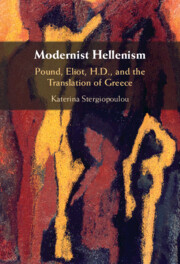Book contents
- Modernist Hellenism
- Modernist Hellenism
- Copyright page
- Dedication
- Contents
- Acknowledgments
- Abbreviations
- Introduction
- Part I Hellenists and Modernists
- Chapter 1 “The some more vital equation”
- Chapter 2 “The glory that was this and the grandeur that was the other”
- Part II “I don’t want to write it”
- Part III Tragedy and Translation in Late Modernism
- Part IV The Long Imagist Poem
- Bibliography
- Index
Chapter 1 - “The some more vital equation”
Writing the Image between Hellenism and Modernism
from Part I - Hellenists and Modernists
Published online by Cambridge University Press: 21 November 2024
- Modernist Hellenism
- Modernist Hellenism
- Copyright page
- Dedication
- Contents
- Acknowledgments
- Abbreviations
- Introduction
- Part I Hellenists and Modernists
- Chapter 1 “The some more vital equation”
- Chapter 2 “The glory that was this and the grandeur that was the other”
- Part II “I don’t want to write it”
- Part III Tragedy and Translation in Late Modernism
- Part IV The Long Imagist Poem
- Bibliography
- Index
Summary
This chapter examines H.D.’s and Pound’s early work with Greek lyric – in particular, the Greek Anthology and Sappho. It traces Pound’s skeptical, ambivalent, and often self-contradictory use of Greek in the 1910s as he tries to articulate his poetics of the image, tracking the differing prisms (Provençal lyric, Bengali poetics, Chinese ideograms, Primitivism, Vorticism) through which he interprets the value of Greek as his own artistic alliances shift between 1908 and 1918. It contrasts Pound’s varying approaches, whether outlined in his prose writings on prosody and the visual arts or actually followed in his early poems based on Greek lyric to H.D.’s already highly sophisticated and well-developed perspective, as seen in her translations also from the Greek Anthology and Sappho – translations which are the basis of some of her best-known poems. The author argues, moreover, that H.D.’s engagement with Greece even at this early stage is more deeply textual, self-conscious, and historically aware than has been recognized. Nonetheless, she show that despite striking differences in tone and some distinction in approach, Pound and H.D.’s poetics were subtly evolving in similar ways.
Keywords
- Type
- Chapter
- Information
- Modernist HellenismPound, Eliot, H.D., and the Translation of Greece, pp. 33 - 80Publisher: Cambridge University PressPrint publication year: 2024

